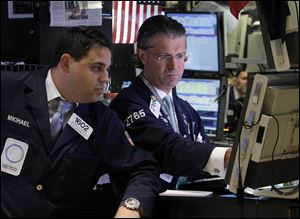
Stocks rise after damage from Irene is less than feared
8/29/2011
Specialists Michael Cacace, left, and Donald Civitanova work on the floor of the New York Stock Exchange Monday, Aug. 29, 2011. Stocks rose broadly Monday, led by insurance companies, after it became clear that the tropical storm caused far less damage than many had feared. The Dow Jones industrial average gained more than 250 points.
NEW YORK — So much for Irene.
Stocks rose broadly Monday, led by insurance companies, after it became clear that the tropical storm caused far less damage than many had feared. The Dow Jones industrial average jumped 254 points.
Trading volume, or the number of shares bought and sold, was the lowest since July 26 as many traders struggled to get to work in Lower Manhattan or were still on vacation.
Insurance stocks rose sharply as analysts lowered their estimates of how much damage the storm would cause. Allstate Corp. rose 8.5 percent, Hartford Financial Services Group Inc. rose 13 percent, and Travelers Cos. Inc. rose 5.1 percent. Insurance and banking stocks in the Standard&Poor's 500 rose 4.2 percent, the most of the 10 company groups that make up the index.
Kinetic Analysis Corp., a consulting firm, sharply lowered its estimate of storm damage from $20 billion late Thursday to $7 billion late Sunday as the storm weakened. Of that amount, insurers would probably have to cover up to $3 billion, Kinetic said. That's less than the $6 billion the industry paid out after Hurricane Isabel struck the region in 2003.
"The U.S. came more or less unscathed through the hurricane," said Kim Caughey Forrest, equity research analyst at Fort Pitt Capital Group. "The cleanup isn't going to cost as much as anticipated."
Utilities companies also rose after it became clear their storm-related expenses would be lower than earlier estimates. Duke Energy Corp., which serves customers in the Carolinas, rose 1.1 percent. New York's biggest utility company, Consolidated Edison Inc., rose 1.3 percent.
The New York Stock Exchange and other major U.S. exchanges opened as usual Monday after making extensive preparations over the weekend. At the NYSE, executives brought in dozens of cots so employees could sleep there to be ready for the opening bell.
The Dow Jones industrial average rose 254.71 points, or 2.3 percent, to close at 11,539.25. It is now down just 0.3 percent for the year. It had been down as much as 7.4 percent for the year on Aug. 10.
The Standard&Poor's 500 index rose 33.28 points, or 2.8 percent, to 1,210.08. The widely used market benchmark has now gained back all of the ground it lost since hitting a 2011 low on Aug. 8, after Standard&Poor's downgraded the U.S. government's credit rating. Since then, it has risen 8.1 percent.
The technology-focused Nasdaq composite index rose 82.26, or 3.3 percent, to 2,562.11.
The Russell 2000 index, a benchmark for small companies, rose 32.86 points, or 4.7 percent, to 724.65. That suggested investors were more willing to take on risk. Small company stocks are more likely to fall in economic downturns, but they also offer the potential of larger gains if the economy does well. The Russell is still down 7.5 percent this year, nearly twice as much as the S&P 500.
Bank of America Corp. rose 8.1 percent, the most of the 30 stocks that make up the Dow average, after the bank said it would sell half of its stake in China Construction Bank Corp. The bank has been selling assets to raise cash to comply with new banking regulations.
Last week billionaire Warren Buffett's company Berkshire Hathaway Inc. said it would invest $5 billion in the bank, giving the troubled company a badly needed boost of confidence. The nation's largest bank has lost 34 percent of its value over the past year as investors worry that its liabilities from soured mortgages will get worse and that it will have to sell large amounts of stock to raise capital.
An increase in consumer spending also helped push stocks higher. The government reported that spending rose 0.8 percent in July. It was a sharp turnaround from June, when Americans spent less for the first time in nearly two years.